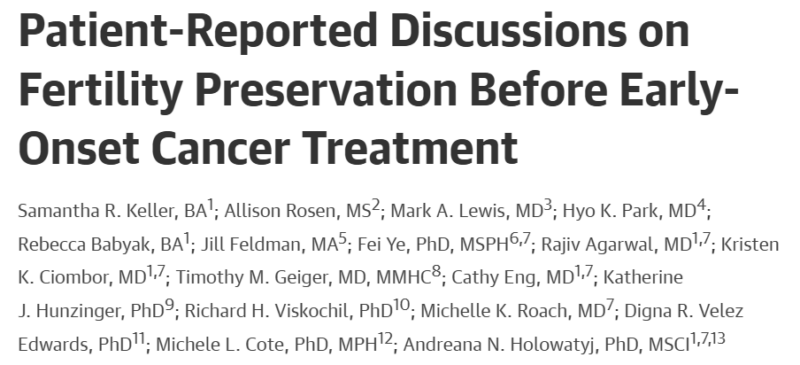Understanding the Gaps in Fertility Preservation Discussions Among Young Cancer Patients: A Cross-Sectional Analysis
The experience of early-onset cancer (defined as cancer in individuals aged 18-49 years) is distinctive, as it involves addressing not only the cancer itself but also the broader impacts on multiple aspects of life, including reproductive health. Despite the widespread acknowledgment of the importance of discussions between patients and healthcare professionals about the potential for infertility and fertility preservation (FP) options prior to cancer treatment, our understanding of this patient experience remains limited.
The questionnaire was administered as part of the Reproductive Health After Cancer Diagnosis and Treatment (REACT) study, an initiative led by Dr. Andreana Holowatyj, Assistant Professor of Medicine at Vanderbilt-Ingram Cancer Center. This study is conducted in collaboration with 23 community organizations and various patient advocacy groups. REACT seeks to enhance clinicians’ and researchers’ understanding of the unmet healthcare needs of adults under 50 diagnosed with cancer, focusing on areas such as fertility, sexual health, body image, physical activity, and personal relationships
“From an early-onset cancer diagnosis through to surveillance and survivorship, we know there are unique care needs for patients and their families that must be considered. That said, we do not yet have the ‘best’ strategies to deliver comprehensive oncology care to all young patients, regardless of age, geographic location, access to care, self-identified race and ethnicity, sex or gender identity.
The REACT study was developed in partnership with patients to capture some of these important insights into what young patients experience, feel and discuss with their cancer care provider — so that we can work to effectively address these unmet needs moving forward.” – said Andreana Holowatyj of the study senior author.

The REACT study was also supported by several prestigious organizations, including the American Cancer Society, the National Cancer Institute, the National Institute of Child Health and Human Development, the National Center for Advancing Translational Sciences, and the Drs. Sidney and Becca Fleischer Undergraduate Summer Research Fund.
In this study, the researchers examined the patterns of fertility preservation (FP) discussions reported by 473 patients who were diagnosed with a first primary early-onset cancer, as part of the REACT (Reproductive Health After Cancer Diagnosis & Treatment) Study.
Methods
The REACT Study‘s recruitment process, self-administered questionnaire elements, and population sources are outlined in the eMethods section of Supplement 1. For the cross-sectional analysis, the study focused on male patients aged 18-49 years and female patients aged 18-42 years who were diagnosed with cancer between 2013 and 2021. These participants were asked the following question: “Did a healthcare professional involved in your cancer care talk with you about options to preserve your fertility (e.g., sperm banking or freezing of eggs, embryos, or ovarian tissue) before you started cancer treatment?” (as shown in the eFigure in Supplement 1).
To assess differences in characteristics based on whether patients reported having a fertility preservation (FP) discussion, the researchers used the χ2 test and Wilcoxon rank-sum test. Cochran-Armitage trend tests were also performed to evaluate trends in age at diagnosis in relation to patient-reported FP discussions. The study followed the STROBE reporting guideline. Statistical analysis was conducted from November 10, 2023, to September 11, 2024, using SAS Institute software, version 9.4. All statistical tests were two-sided (unless otherwise specified), with a P-value of <.05 considered statistically significant.
Results
Half of the patients in the study (240 out of 473, or 50.7%) reported having a discussion with a healthcare professional about fertility preservation (FP) options before starting cancer treatment (Table). The prevalence of these patient-reported FP discussions varied significantly based on factors such as age, pregnancy history, and marital status.
A further breakdown of FP discussions by cancer type is shown in the Figure. Notably, the lowest rates of FP discussions were observed among younger patients with thyroid, lung or bronchus, ovarian, and colorectal cancers, with 3.6% (1 out of 28), 21.0% (13 out of 62), 21.4% (3 out of 14), and 44.2% (42 out of 95), respectively, reporting such discussions.
Discussion
In this cross-sectional study, it was found that approximately half of the patients with early-onset cancer did not report having a discussion with their healthcare professional about fertility preservation (FP) options before initiating treatment. What distinguishes this study is its patient-centered approach: rather than relying on documentation from electronic medical records (EMR) or healthcare professionals’ self-reports, it directly asked patients about their experiences and the discussions they had with their cancer care team.
However, the study of patient perceptions and experiences inherently introduces the risk of recall bias. Patients may not always accurately remember such discussions, possibly due to factors such as a lack of interest in having children, the stress of receiving an early cancer diagnosis, or an inability to pursue FP options.
If FP was discussed but not fully understood or recalled by the patient, the study may underreport the true prevalence of FP discussions in clinical practice. This also highlights the numerous pressures that patients face during an initial oncology consultation and subsequent visits following an early cancer diagnosis, underscoring the importance of ensuring that fertility discussions are appropriately timed and clearly communicated.
Cancer therapies that affect gonadal function vary depending on the disease type and treatment regimen. This study adds to the existing literature by examining patterns of patient-reported FP discussions across a range of cancer types, focusing on both males and females of reproductive age. Using data from the REACT Study, which includes a large patient population across 30 different early-onset cancer types, the researchers were able to explore these patterns in depth.
“We want all young patients diagnosed with cancer to get comprehensive, high-quality oncology care, which includes reproductive health care, like we deliver here at Vanderbilt. Our discovery that 1 in every 2 patients in REACT reported not having had a discussion on fertility preservation options with their health care professional before starting early-onset cancer treatment is alarming.
Notwithstanding the potential drawback that not all patients may have remembered this conversation, our clinically significant findings shed light on the crucial need to tailor strategies that will deliver concordant reproductive health care to this growing patient population.” – said Andreana Holowatyj.
However, several limitations should be noted. The study’s recruitment strategy, particularly during the COVID-19 pandemic, may have resulted in a skewed demographic, with overrepresentation of insured patients or those from higher socioeconomic backgrounds, potentially limiting the generalizability of the findings.
Overall, this study emphasizes the need for effective, tailored strategies to ensure that reproductive health care is delivered in a way that aligns with the needs of the growing population of early-onset cancer patients. This approach is crucial for ensuring that patients receive appropriate information and support related to fertility preservation options, enabling them to make informed decisions about their future reproductive health.
Summary
This study examined the frequency and patterns of fertility preservation (FP) discussions reported by 473 patients with early-onset cancer (aged 18-49 years for males and 18-42 years for females). Approximately 50.7% of patients reported having a discussion with their healthcare professional about FP options before starting cancer treatment.
The prevalence of these discussions varied significantly based on age, pregnancy history, and marital status, with the lowest rates seen among patients with thyroid, lung, ovarian, and colorectal cancers. The study’s patient-centered approach provides valuable insights into the patient experience, highlighting the need for timely and clear communication about reproductive health options.
However, limitations such as recall bias and the lack of clinical data, such as disease stage and treatment regimen, suggest that further research is needed to understand the factors influencing FP discussions. Ultimately, the study emphasizes the importance of tailoring reproductive health care strategies to better meet the needs of the growing population of early-onset cancer patients.
Patient-Reported Discussions on Fertility Preservation Before Early-Onset Cancer Treatment
Authors: Samantha R. Keller, Allison Rosen, Mark A. Lewis, Hyo K. Park, Rebecca Babyak, Jill Feldman, Fei Ye, Rajiv Agarwal, Kristen K. Ciombor, Timothy M. Geiger, Cathy Eng, Katherine J. Hunzinger, Richard H. Viskochil, Michelle K. Roach, Digna R. Velez Edwards, Michele L. Cote, Andreana N. Holowatyj,

For more posts like this visit oncodaily.com


